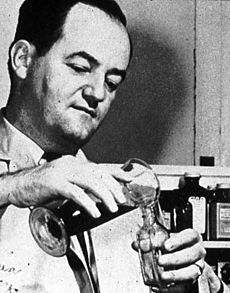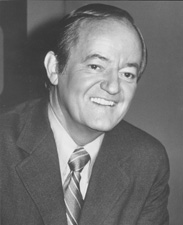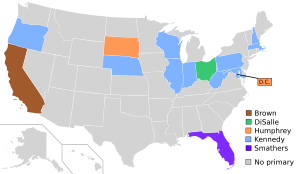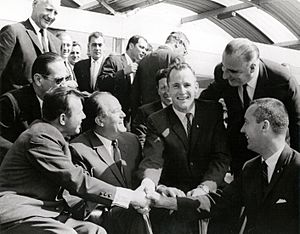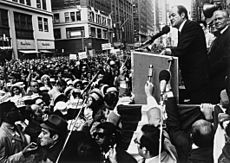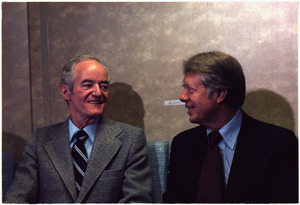Hubert Humphrey facts for kids
Quick facts for kids
Hubert Humphrey
|
|
|---|---|
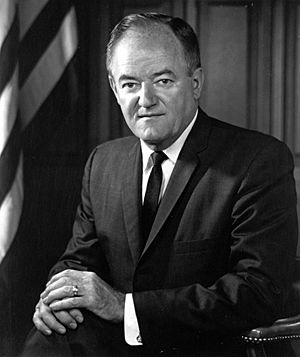
Official portrait, 1965
|
|
| 38th Vice President of the United States | |
| In office January 20, 1965 – January 20, 1969 |
|
| President | Lyndon B. Johnson |
| Preceded by | Lyndon B. Johnson |
| Succeeded by | Spiro Agnew |
| United States Senator from Minnesota |
|
| In office January 3, 1971 – January 13, 1978 |
|
| Preceded by | Eugene McCarthy |
| Succeeded by | Muriel Humphrey |
| In office January 3, 1949 – December 29, 1964 |
|
| Preceded by | Joseph H. Ball |
| Succeeded by | Walter Mondale |
| Deputy President pro tempore of the United States Senate | |
| In office January 5, 1977 – January 13, 1978 |
|
| President | James Eastland |
| Preceded by | Position established |
| Succeeded by | George J. Mitchell (1987) |
| Senate Majority Whip | |
| In office January 3, 1961 – December 29, 1964 |
|
| Leader | Mike Mansfield |
| Preceded by | Mike Mansfield |
| Succeeded by | Russell B. Long |
| 35th Mayor of Minneapolis | |
| In office July 2, 1945 – November 30, 1948 |
|
| Preceded by | Marvin L. Kline |
| Succeeded by | Eric G. Hoyer |
| Personal details | |
| Born |
Hubert Horatio Humphrey Jr.
May 27, 1911 Wallace, South Dakota, U.S. |
| Died | January 13, 1978 (aged 66) Waverly, Minnesota, U.S. |
| Resting place | Lakewood Cemetery |
| Political party | Democratic–Farmer–Labor |
| Spouse | |
| Children | 4, including Skip |
| Education |
|
| Signature | |
Hubert Horatio Humphrey Jr. (May 27, 1911 – January 13, 1978) was an American politician. He served as the 38th Vice President of the United States from 1965 to 1969. He was also a United States Senator for Minnesota twice. He served from 1949 to 1964 and again from 1971 to 1978.
As a senator, Humphrey was a major leader for liberal ideas. When he was Vice President under Lyndon B. Johnson, he supported the Vietnam War. This war was very unpopular. In 1968, the Democratic Party nominated him for president. He lost that election to Richard Nixon.
Humphrey was born in Wallace, South Dakota. He went to the University of Minnesota. In 1945, he became the mayor of Minneapolis. He served until 1948. In 1948, he was elected to the U.S. Senate. He strongly pushed for ending racial segregation in the Democratic Party's plans.
During his time in the Senate, he helped write the Civil Rights Act of 1964. This law was very important for equal rights. He also first suggested creating the Peace Corps. This group sends American volunteers to help people in other countries. He was known as "The Happy Warrior" because of his cheerful attitude and strong support for liberal causes.
Contents
- Early Life and Education
- Marriage and Early Career
- Mayor of Minneapolis
- 1948 Democratic National Convention
- United States Senator (1949–1964)
- Presidential and Vice-Presidential Ambitions (1952–1964)
- Vice Presidency (1965–1969)
- Post-Vice Presidency (1969–1978)
- Death and Funeral
- Honors and Legacy
- Portrayals
- See also
Early Life and Education
Hubert Humphrey was born in Wallace, South Dakota. His father owned a drugstore. His mother was a Norwegian immigrant. Hubert spent most of his childhood in Doland, South Dakota. The town had about 600 people. His father was a pharmacist and also served as mayor.
Due to money problems, Humphrey left the University of Minnesota after one year. He became a licensed pharmacist. He helped his father run their drugstore from 1931 to 1937. They even made their own medicines for animals and people.
Humphrey did not enjoy being a pharmacist. He dreamed of becoming a college professor. In 1937, he returned to the University of Minnesota. He earned his Bachelor of Arts degree in 1939. He also got a master's degree from Louisiana State University in 1940. He taught political science there.
He was a great debater at the University of Minnesota. He supported Franklin D. Roosevelt in the 1940 presidential election. Humphrey soon became active in politics in Minneapolis. Because of this, he never finished his PhD.
Marriage and Early Career
In 1934, Humphrey started dating Muriel Buck. She was a bookkeeper. They married in 1936 and had four children. Money was often a problem for the Humphreys. He often gave paid speeches to earn more money.
During World War II, Humphrey tried to join the military three times. He tried to join the Navy and the Army. He was rejected each time. This was because he was colorblind and had other health issues. Despite this, some people later unfairly accused him of avoiding the draft.
Humphrey worked for different government agencies during the war. He also taught political science at Macalester College. From 1943 to 1944, he led a department focused on international politics.
In 1943, Humphrey first ran for Mayor of Minneapolis. He lost, but got over 47% of the votes. In 1944, he helped create the Minnesota Democratic–Farmer–Labor Party (DFL). This party combined the Democratic and Farmer-Labor parties in Minnesota. He also worked on President Roosevelt's 1944 campaign. In 1945, Humphrey successfully fought to remove Communists from the DFL party.
Mayor of Minneapolis
After World War II, Humphrey ran for mayor of Minneapolis again. This time, he won with 61% of the votes. As mayor, he worked to reduce crime. He also gained national attention. He helped start a group called Americans for Democratic Action (ADA). This group was liberal and against communism.
Humphrey also worked to reform the Minneapolis police force. The city had problems with anti-Semitism and discrimination against African Americans. Humphrey fought against all forms of prejudice. He created the Council on Human Relations. He also made Minneapolis one of the first cities to ban racial discrimination in jobs. He was reelected mayor in 1947 by a huge margin.
1948 Democratic National Convention
In 1948, the Democratic Party was divided. Northern Democrats wanted the government to protect civil rights for minorities. Southern Democrats wanted states to keep racial segregation.
The party's plan for the 1948 election did not strongly support civil rights. President Harry S. Truman had avoided strong civil rights actions. But Humphrey believed the Democratic Party had to fight for equal rights.
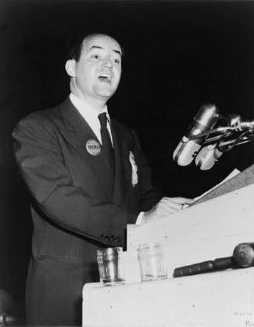
Humphrey and other liberals wanted a stronger civil rights plan. They proposed adding a "minority plank" to the party's platform. This plank called for federal laws against lynching. It also wanted to end school segregation and job discrimination.
Even though President Truman's team tried to stop him, Humphrey spoke for the stronger plan. In a famous speech, he said, "To those who say that we are rushing this issue of civil rights, I say to them we are 172 years (too) late!" He added that the party should "walk forthrightly into the bright sunshine of human rights!"
Humphrey and his allies won. The convention voted to adopt the strong civil rights plan. After this, some Southern Democrats left the convention. They formed the Dixiecrat party. They nominated their own presidential candidate, Strom Thurmond. They hoped to defeat Truman.
But their plan backfired. The civil rights plank helped Truman gain many votes from African Americans. Especially in large northern cities. Truman won the election against Thomas E. Dewey. This showed that the Democratic Party could win without the "Solid South." Many historians believe Humphrey played a key role in Truman's victory.
United States Senator (1949–1964)
Humphrey was elected to the United States Senate in 1948. He became the first Democrat from Minnesota elected to the Senate since before the Civil War. He was reelected in 1954 and 1960. His fellow senators chose him as the Senate Majority Whip in 1961. He held this job until he became Vice President in 1964.
At first, Southern Democrats avoided Humphrey. They were upset about his civil rights stance. But Humphrey stood firm. His honesty and strong speeches eventually earned him respect. He became a close friend of Senate Majority Leader Lyndon B. Johnson.
Humphrey was known for supporting liberal causes. These included civil rights, arms control, and food stamps. He was also known for his long and funny speeches.
He fought against the McCarran Internal Security Act in 1950. This bill aimed to control the American Communist Party. Humphrey also proposed making Communist Party membership a felony in 1954.
Humphrey was also a key supporter of the Humane Slaughter Act of 1958. This law aimed to make the slaughter of animals more humane. He also helped create the Durham-Humphrey Amendment. This law defined how medications are sold, either by prescription or over-the-counter.
As the Democratic whip in 1964, Humphrey was very important. He helped pass the Civil Rights Act of 1964. He was a main author of the law. His cheerful attitude and strong support for liberal causes earned him the nickname "The Happy Warrior."
Many people credit President John F. Kennedy with creating the Peace Corps. But Humphrey introduced the first bill to create it in 1957. This was three years before Kennedy's famous speech. Humphrey also had ideas for the Food for Peace program and Medicare. President Johnson once said, "Most Senators are minnows ... Hubert Humphrey is among the whales." This meant Humphrey was a very important senator.
Presidential and Vice-Presidential Ambitions (1952–1964)
Humphrey ran for president twice before becoming Vice President in 1964. His first try was in 1952. He ran again in 1960.
In 1960, Humphrey ran against Senator John F. Kennedy in the primary elections. Kennedy had a very organized and well-funded campaign. Humphrey's campaign had little money. Humphrey joked that he "felt like an independent merchant competing against a chain store." Kennedy's family, including his wife Jacqueline, helped him campaign.
Kennedy won the Wisconsin primary. Humphrey then decided to run against Kennedy in the West Virginia primary. West Virginia was mostly rural and Protestant. Humphrey thought he had a good chance there.
Kennedy directly addressed the issue of his Catholic religion. He argued for tolerance. This put Humphrey, who always supported tolerance, on the defensive. Kennedy's campaign also spread false rumors that Humphrey had avoided military service in World War II. Humphrey had tried to join the military but was rejected due to health issues.
Humphrey ran out of money. He could not compete with Kennedy's well-funded campaign. Kennedy won West Virginia by a large margin. Humphrey then left the race. Kennedy's win in West Virginia showed that a Catholic could win the presidency.
Vice Presidential Campaign
After his 1960 defeat, Humphrey realized he might only become president if he first served as Vice President. This would give him more visibility and support. So, in 1964, he wanted to be Lyndon B. Johnson's running mate.
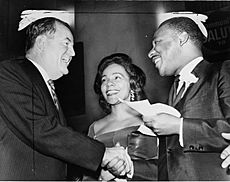
At the 1964 Democratic National Convention, Johnson kept everyone guessing. Finally, he announced Humphrey as his choice. Johnson praised Humphrey's skills.
The Johnson-Humphrey ticket won the election by a huge amount. They received 486 out of 538 electoral votes. Only five Southern states and Goldwater's home state of Arizona supported the Republican ticket. Humphrey had predicted a large win.
Vice President-elect of the United States
After winning the election, Humphrey and Johnson met. Johnson told Humphrey he would help with government civil rights programs. Humphrey resigned his Senate seat in December 1964. This allowed Walter Mondale to take his place.
Vice Presidency (1965–1969)
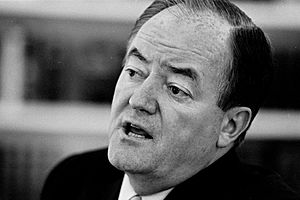
Humphrey became Vice President on January 20, 1965. He was initially unsure about the growing Vietnam War. After an attack on a U.S. military base in Vietnam in February 1965, Humphrey advised President Johnson against bombing North Vietnam. He warned that bombing would require sending U.S. ground troops. He also predicted a military solution would take years.
President Johnson was unhappy with Humphrey's advice. He kept Humphrey out of his inner circle for months. Humphrey then decided to fully support the war effort.
As Vice President, Humphrey was very loyal to President Johnson. He supported Johnson's policies, even the Vietnam War. Many of his liberal friends were upset by this. They wanted him to criticize Johnson's war policies. But Johnson had warned Humphrey that public criticism would hurt his chances of becoming president.
The songwriter Tom Lehrer even wrote a satirical song about Humphrey. It was called "Whatever Became of Hubert?" The song suggested that Humphrey had become less outspoken as Vice President.
Humphrey was a frequent guest on The Tonight Show with Johnny Carson. He also became friends with singer Frank Sinatra.
In April 1965, Humphrey spoke to newspaper editors. He promised that Congress would do great things for the nation. In May 1965, he visited Dallas, Texas. Security was very tight because of the assassination of John F. Kennedy a year and a half earlier.
In May 1967, Humphrey said that American anger about Vietnam was decreasing. He also suggested that states create peacekeeping councils. These councils would prevent violence and encourage community cooperation.
Civil Rights
In February 1965, President Johnson made Humphrey chairman of the President's Council on Equal Opportunity. Humphrey had suggested this position. The council would help government agencies work together on civil rights. It would also prevent racial unrest.
After the Watts riots in August 1965, Johnson reduced Humphrey's role in civil rights. Johnson felt Humphrey had too much work. Humphrey reluctantly agreed to this change.
In August 1967, Humphrey spoke in Detroit. He called for a "Marshall Plan" to fight poverty and racial violence in the U.S. He also pushed for civil peace councils. These councils would include all minority groups, religions, and law enforcement.
Foreign Trips
In December 1965, Humphrey began a tour of eastern countries. He hoped for "cordial and frank discussions." He met with the Prime Minister of Japan. He asked for support in achieving peace in the Vietnam War.
In March 1967, Humphrey toured Europe. He wanted to improve relations. He met with the Prime Minister of the United Kingdom. They discussed topics like the nuclear nonproliferation treaty. During his trip, some protesters threw eggs and fruit at his car in Brussels, Belgium. In late December 1967, Humphrey began a tour of Africa.
1968 Presidential Election
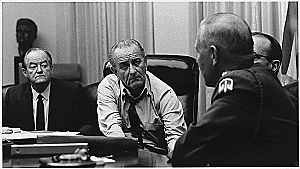
In 1968, President Johnson was expected to win the Democratic nomination again. Humphrey was expected to be his running mate. But Senator Eugene McCarthy challenged Johnson. McCarthy ran on an anti-Vietnam War platform.
McCarthy nearly defeated Johnson in the New Hampshire primary. A few days later, Senator Robert F. Kennedy also entered the race. He also ran on an anti-war platform. On March 31, 1968, President Johnson surprised the nation. He announced he would not seek reelection.
Humphrey announced his presidential candidacy on April 27, 1968. He supported Johnson's Vietnam policies. He also proposed sending more troops and increasing the defense budget. Later, he opposed proposals to immediately end bombings in Vietnam.
Many saw Humphrey as Johnson's replacement. He gained strong support from labor unions. He also had support from other Democratic groups. These groups were worried about anti-war protesters and social unrest. Some journalists noted that Humphrey, despite his liberal past, had become a strong supporter of the war.
Humphrey entered the race too late to participate in many Democratic primary elections. He focused on winning delegates in states without primaries. By June, McCarthy and Kennedy had won some primaries. But Humphrey was still the front-runner in delegate count.
The California primary was very important for Kennedy. On June 4, 1968, Kennedy defeated McCarthy in California. But the nation was shocked again. Senator Kennedy was assassinated after his victory speech. After Kennedy's death, Humphrey stopped his campaign for two weeks.
Chicago Riots and Party Fallout
Humphrey did not enter any of the state primary elections. But he won the Democratic nomination at the 1968 Democratic National Convention in Chicago. He chose Senator Edmund Muskie as his running mate.
During the convention, thousands of anti-war protesters gathered in Grant Park. Mayor Richard J. Daley's Chicago police attacked and beat these protesters. This caused more public unrest.
Humphrey's lack of action during these events hurt his campaign. Johnson's unpopularity and the Chicago protests also contributed. Many liberals and African Americans were discouraged after the assassinations of Robert F. Kennedy and Martin Luther King Jr. that year. All these factors made it hard for Humphrey to win.
Humphrey lost the election to Richard Nixon. He lost the popular vote by less than one percent. Nixon won the electoral college. In his concession speech, Humphrey said, "I have done my best. I have lost; Mr. Nixon has won. The democratic process has worked its will."
Post-Vice Presidency (1969–1978)
Teaching and Return to the Senate
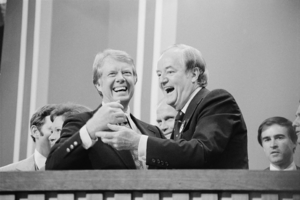
After leaving the Vice Presidency, Humphrey taught at Macalester College and the University of Minnesota. He also worked for the Encyclopædia Britannica Educational Corporation.
In 1969, Humphrey met with Mayor Richard J. Daley. He denied ever being "at war" with Daley. He also supported President Nixon's peace efforts in Vietnam. He said that Nixon was trying to end the war.
Humphrey had not planned to return to politics. But an opportunity came up. Senator Eugene McCarthy decided not to run for reelection in 1970. Humphrey won the nomination for the Senate seat. He defeated Republican Congressman Clark MacGregor. He returned to the U.S. Senate on January 3, 1971. He was reelected in 1976 and served until his death.
Fourth Senate Term
When he returned to the Senate, Humphrey was a junior senator again. He worked to regain his standing with liberals.
In May 1971, Humphrey criticized a call for President Nixon's impeachment. He said it was "more out of emotion and passion than reason." He also said that ending hunger in the U.S. was "a moral obligation."
In 1972, Humphrey said the U.S. would have been out of the Vietnam War if he had been elected president. He said Nixon was taking too long to withdraw troops. He also supported removing barriers to voting registration.
In January 1974, Humphrey had tests for a small tumor in his bladder. He was reportedly pleased when Nixon resigned from the presidency.
In April 1975, Humphrey called for a national department of education. He also wanted more federal funding for education. In October, after an assassination attempt on President Ford, Humphrey urged presidential candidates to limit their campaigning. This was to prevent future attacks.
In October 1976, Humphrey had surgery to remove a cancerous bladder. He predicted he would win his reelection bid.
1972 Presidential Election
In 1972, Humphrey ran for the Democratic nomination for president again. He announced his candidacy on January 10, 1972. He ran on a platform of ending the Vietnam War and improving the U.S. economy. He still had support from labor unions, African Americans, and Jewish communities. But college students did not like him because of his past support for the Vietnam War.
Humphrey initially planned to skip the primary elections. But he changed his mind. He won some primaries, including Ohio, Indiana, and Pennsylvania. However, he lost to George McGovern in other important primaries, like California. McGovern also had better organization in caucus states.
Humphrey tried to challenge some of McGovern's delegates. But his efforts failed. McGovern won the nomination. McGovern asked Humphrey to be his running mate, but Humphrey declined.
1976 Presidential Election
In April 1974, Humphrey said he would not run for president in 1976. He encouraged his fellow Minnesotan Senator Walter Mondale to run instead. In December 1975, a poll showed Humphrey as a leading Democratic candidate.
In April 1976, Humphrey announced he would not enter the New Jersey primary. He also would not allow any committees to support him. Even after Jimmy Carter had enough delegates to win the nomination, many still hoped Humphrey would run. But he did not. Humphrey had learned he had terminal cancer, which led him to sit out the race.
Fifth Senate Term
In May 1977, Humphrey attended a White House meeting. He told President Carter that the U.S. would have high unemployment without economic help. He also said that a preventative health care program was needed.
Deputy President Pro Tempore of the Senate (1977–1978)
In 1974, Humphrey helped write the Humphrey-Hawkins Full Employment Act. This was the first attempt at a law to guarantee full employment. A weaker version of the bill passed in 1978. It aimed for 4 percent unemployment and 3 percent inflation.
Humphrey ran for Majority Leader after the 1976 election. But he lost to Robert Byrd. The Senate honored Humphrey by creating a special position for him: Deputy President pro tempore of the Senate.
On August 16, 1977, Humphrey revealed he had terminal bladder cancer. On October 25, he gave a speech to the Senate. On November 3, he became the first person other than a member of the House or the President to speak to the House of Representatives. President Carter honored him by letting him command Air Force One for his last trip to Washington.
One of Humphrey's last speeches included a famous line: "It was once said that the moral test of Government is how that Government treats those who are in the dawn of life, the children; those who are in the twilight of life, the elderly; and those who are in the shadows of life, the sick, the needy and the handicapped." This is often called the "liberals' mantra."
Death and Funeral
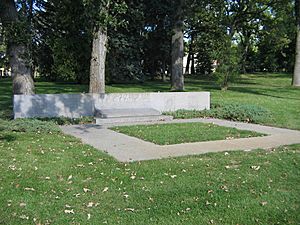
Humphrey spent his final weeks calling old political friends. He even invited Richard Nixon to his funeral, and Nixon accepted. While in the hospital, Humphrey visited other patients. He told them jokes and listened to them. On January 13, 1978, he died of bladder cancer at his home in Waverly, Minnesota. He was 66 years old.
Humphrey's body lay in state at the U.S. Capitol and the Minnesota State Capitol. He was buried at Lakewood Cemetery in Minneapolis. Many important people attended his funeral. These included Gerald Ford, Richard Nixon, President Carter, and Vice President Walter Mondale. Mondale said, "He taught us how to live, and finally he taught us how to die."
Humphrey's wife, Muriel, was appointed to serve in the U.S. Senate after his death. She did not run for election to keep the seat. She later married Max Brown and took the name Muriel Humphrey Brown. She was buried next to Humphrey in 1998.
Honors and Legacy
In 1965, Humphrey became an Honorary Life Member of Alpha Phi Alpha. This is a historically African American fraternity.
In 1978, he received the U.S. Senator John Heinz Award for Public Service. He was given the Congressional Gold Medal in 1979 and the Presidential Medal of Freedom in 1980. These are very high honors.
The United States Postal Service honored him with a postage stamp. There is also a statue of him in front of Minneapolis City Hall.
Humphrey is remembered for his early work in civil rights. However, his long support of the Vietnam War is also part of his legacy. His biographer, Arnold A. Offner, called him "the most successful legislator in the nation's history." He was also a strong voice for equal justice.
Namesakes
Many places and programs are named after Hubert H. Humphrey:
- The Hubert H. Humphrey Fellowship Program. This program helps people from different countries learn from each other.
- The Hubert H. Humphrey Terminal at Minneapolis–Saint Paul International Airport.
- The former Hubert H. Humphrey Metrodome stadium in Minneapolis.
- The Hubert H. Humphrey Job Corps Center in St. Paul, Minnesota.
- The Hubert H. Humphrey School of Public Affairs at the University of Minnesota.
- The Hubert H. Humphrey Building in Washington, D.C. This building belongs to the United States Department of Health and Human Services.
- The Hubert H. Humphrey Bridge in Florida.
- Several schools are named after him, including middle schools and elementary schools.
- The Hubert H. Humphrey Cancer Center in Robbinsdale, Minnesota.
Portrayals
Hubert Humphrey has been played by actors in films and TV shows:
- Franklin Cover in the 1982 TV film A Woman Called Golda.
- Bradley Whitford in the 2016 TV film All the Way.
- Doug McKeon in the 2017 film LBJ.
See also
 In Spanish: Hubert Humphrey para niños
In Spanish: Hubert Humphrey para niños
- Politics of Minnesota
- Humphrey's son, Skip Humphrey and grandson Buck Humphrey are also Minnesotan politicians.
- List of United States Congress members who died in office (1950–99)
- Humphrey objection
 | Isaac Myers |
 | D. Hamilton Jackson |
 | A. Philip Randolph |


